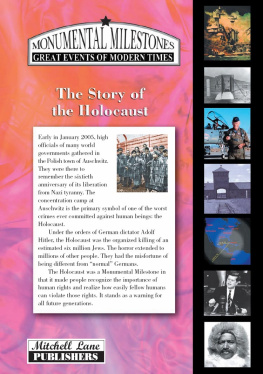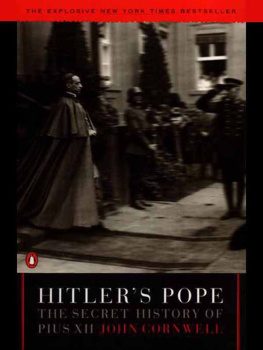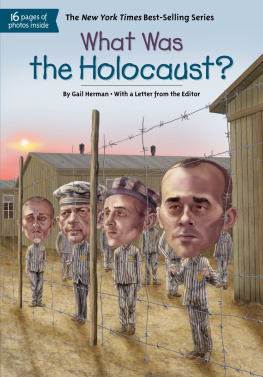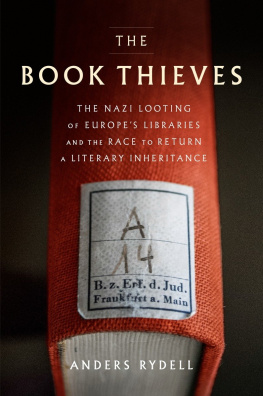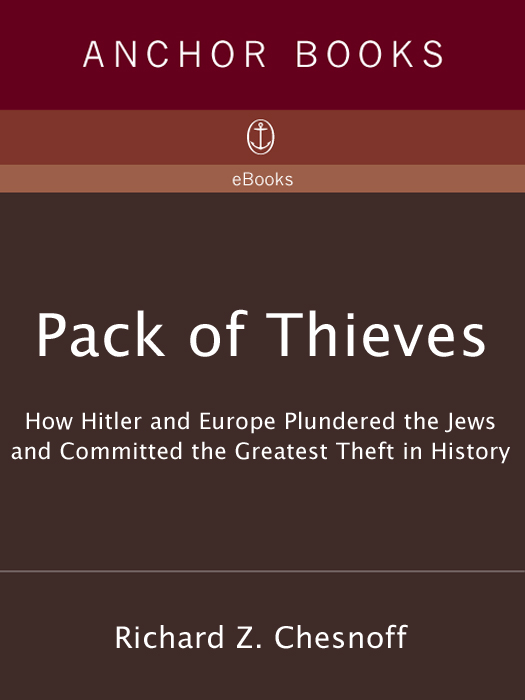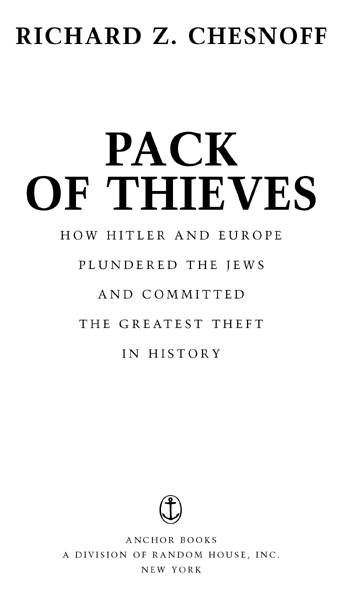Acclaim for Richard Chesnoff andPack of Thieves
The first comprehensive expose of the network of theft and cloaking employed by the Nazis, their collaborators, the neutralsand even the Alliesto steal billions from the Jews of Europe before, during, and after the Holocaust. An electrifying book that could only have been written by an international journalist of Richard Chesnoffs stature.
Edgar Bronfman, World Jewish Congress
If one had to summarize this book in one word, that word would be relentless. Chesnoffs mission here is to show us, in excruciating detail, how the Nazis not only made a science of killing the Jews but of robbing them as well, and how the better part of Europe joined in the plunder.
The Hartford Courant
The stories Chesnoff describes of Jewish survivors returning to discover strangers living in their homes, even wearing their clothes, only to be snubbed by bureaucrats, are chilling. In Chesnoffs roll of dishonour, no European nation escapes.
The Sunday Times (London)
By any measure, it was the heist of this or any other century. Chesnoff leavens his narrative with several personal stories that poignantly register the enormity of the individual losses.
Toronto Globe and Mail
Pack of Thieves is a good way to start an ulcer bleeding. Its not that we didnt know it. But here is the documentation, the figures, the anecdotes of camp survivors going back to homes taken by neighbors and not returned, of life insurance unpaid, of recompense for slave labor ignored. Let everyone know what Mr. Chesnoff has reported: what happened where, and at whose hands, and to whose benefit.
Anne Roiphe, New York Observer
Gripping. A tale of legalised theft on an epic scale, of offers that cannot be refused. Not a pretty story but a well told one.
Daily Mail (London)
Pack of Thieves includes many countries, and brings alive the injustice of the plunder by telling the personal stories of the individuals who were victimized. It is important to read Pack of Thieves. Perhaps it will open the door to justice in the future among ethnic groups of the global universe.
Professor Yaffa Eliach,
author of There Once Was a Village and
creator of the Tower of Life,
U.S. Holocaust Memorial Museum
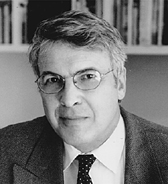
Richard Chesnoff
Pack of Thieves
Richard Z. Chesnoff is a contributing editor of U.S. News & World Report and op-ed columnist for the New York Daily News. For more than thirty years, he has covered many of the major events and personalities of our times. Winner of both the Overseas Press Club and National Press Club Awards, he was among the first journalists to break the story that Swiss banks and European governments were hiding the assets of Holocaust victims. He lives in New York and France.
ALSO BY RICHARD Z. CHESNOFF
If Israel Lost the War
(with Edward Klein & Robert Littell)
Philippines
FIRST ANCHOR BOOKS EDITION, JANUARY 2001
Copyright 1999 by Richard Chesnoff
All rights reserved under International and Pan-American Copyright Conventions. Published in the United States by Anchor Books, a division of Random House, Inc., New York, and simultaneously in Canada by Random House of Canada Limited, Toronto. Originally published in hardcover in the United States by Doubleday, a division of Random House, Inc., New York, in 1999.
Anchor Books and colophon are registered trademarks of Random House, Inc.
The Library of Congress has cataloged the Doubleday
edition as follows:
Chesnoff, Richard Z., 1937
Pack of thieves: how Hitler and Europe plundered the Jews and committed the greatest theft in history / by Richard Z. Chesnoff.
p. cm.
1. Holocaust, Jewish (19391945) 2. Jewish propertyEurope
History20th century. 3. World War, 19391945
Confiscations and contributionsEurope. I. Title.
D804.3.C446 1999
940.53 18dc21 99-33257
eISBN: 978-0-307-76694-6
Author photograph Jerry Bauer
www.anchorbooks.com
v3.1
Contents
CHAPTER 1
Germany: The Plunder Plot
CHAPTER 2
Austria: Last Year at Mauerbach
CHAPTER 3
Czechoslovakia
CHAPTER 4
The Netherlands: Loot Thy Neighbor
CHAPTER 5
Norway: Traitors in Their Midst
CHAPTER 6
France: Les Biens des Juifs
CHAPTER 7
Eastern Europe: Plundering the Killing Fields
CHAPTER 8
Switzerland: Neighbors Make Good Fences
CHAPTER 9
The Other Neutrals
CHAPTER 10
Restitution: Righting Wrongs
If there is no justice, there is no peace.
B AHYA BEN A SHER , thirteenth-century kabbalist, Kad Hakemach
Both are thieves, the receiver as well as the stealer.
P HOCYLIDES , sixth-century B.C.E . poet, Moral Epigrams
For my son Adam,
his children and his childrens children
Introduction
This is a book about justice for victims. This is also a book about the evils of hatred and greed, about the maelstrom of deceit and injustice that swallows people who allow their basic human compassion and decency to be overwhelmed by an all too willing embrace of avarice and noncaring.
For ideological Nazis and devoted anti-Semites, stealing from the Jews of Europe was a vital step in the historic crusade to Aryanize the world. It was a totally normal stage in what they perceived as a totally reasonable Final Solution. In the Nazi mind, says Harvard Universitys Daniel Goldhagen, author of Hitlers Willing Executioners, depriving Jews of anything and everything they had worked for, then further pauperizing them by denying them a means of livelihood was part of the punishment the Jews deserved.
Yet not all those who joined the pack of thieves that howled through Europe were pure ideological Nazis. For many, running alongside the raucous bandwagon of Hitlers National Socialist crusade was simply a means of enriching themselves at the expense of the Jewsfrom the wealthiest Warburgs and Rothschilds to the poorest of the shtetl and urban Jews who made up the predominant number of Holocaust victims. Certainly not all the predators were Germans or Austrians. There were Frenchmen and Dutchmen, Norwegians and Czechs, Belgians and Slovaks, Lithuanians, Poles, Estonians, Hungarians, Romanians, Croats, and Bosnians. In every nation of Europe where the genocidal Nazi machine dragged Jews away to their death, there were upstanding local citizens waiting to loot what was left behindart dealers in Paris, hotelkeepers in Budapest, stockbrokers in Amsterdam, grocers in Lyons, department-store owners in Brussels, manufacturers in Oslo, peasant farmers and housewives from Latvia to Transylvania, and everywhere bankers, lawyers, and financiersall barely able to contain themselves at the prospect of picking at the bones of their Jewish neighbors.
The evil continued well beyond the destruction of the Third Reich and the end of Europes World War II. Newly liberated nations like France and the Netherlands conveniently absorbed into their own governmental coffers much of what remained from Nazi loot. Few made any intense effortor any effort at allto find the heirs of victims.


